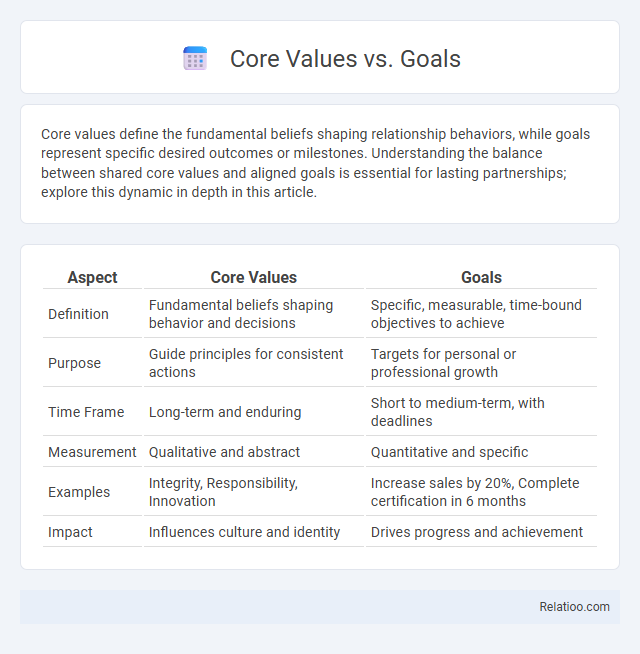Core values define the fundamental beliefs shaping relationship behaviors, while goals represent specific desired outcomes or milestones. Understanding the balance between shared core values and aligned goals is essential for lasting partnerships; explore this dynamic in depth in this article.
Table of Comparison
| Aspect | Core Values | Goals |
|---|---|---|
| Definition | Fundamental beliefs shaping behavior and decisions | Specific, measurable, time-bound objectives to achieve |
| Purpose | Guide principles for consistent actions | Targets for personal or professional growth |
| Time Frame | Long-term and enduring | Short to medium-term, with deadlines |
| Measurement | Qualitative and abstract | Quantitative and specific |
| Examples | Integrity, Responsibility, Innovation | Increase sales by 20%, Complete certification in 6 months |
| Impact | Influences culture and identity | Drives progress and achievement |
Understanding Core Values and Goals
Core values represent the fundamental beliefs and guiding principles that shape your decisions and behavior, while goals are specific, measurable outcomes you aim to achieve. Understanding core values helps you align your goals with what truly matters, ensuring sustained motivation and authentic success. Your ability to distinguish between these concepts enhances clarity and drives purposeful action in both personal and professional settings.
Defining Core Values: The Foundation of Beliefs
Core values represent the fundamental beliefs that guide your behavior and decision-making, acting as the foundation for how you interact with the world. Unlike goals, which are specific achievements or milestones you aim to reach, core values remain constant and shape the principles behind your actions. Defining core values provides clarity and consistency, ensuring that your choices align with your inherent beliefs and long-term vision.
What Are Goals? Clarity and Purpose
Goals are specific, measurable targets that guide actions and decisions, providing clarity and purpose to personal or organizational efforts. They serve as benchmarks for progress, ensuring alignment with broader core values by translating abstract principles into concrete achievements. Clear goals enhance motivation and focus, driving consistent performance toward desired outcomes.
Key Differences Between Core Values and Goals
Core values represent fundamental beliefs guiding behavior and decision-making, while goals are specific, measurable outcomes an individual or organization strives to achieve. Core values remain consistent over time, reflecting identity and principles, whereas goals are time-bound targets that can evolve based on progress and circumstances. Differentiating between core values and goals is crucial for aligning actions with purpose and ensuring strategic focus drives meaningful results.
The Relationship Between Values and Goals
Core values serve as the foundational beliefs guiding your decisions, while goals are specific objectives set to achieve desired outcomes; the relationship between values and goals ensures that your pursuits align with what truly matters to you. When your goals reflect your core values, motivation and commitment increase, leading to more meaningful achievements. Understanding this connection helps you prioritize actions that support your authentic purpose and long-term fulfillment.
Why Core Values Matter in Decision-Making
Core values serve as fundamental principles that guide your behavior and decision-making, providing a consistent framework for evaluating choices. Unlike goals, which are specific outcomes you aim to achieve, core values influence how you prioritize options and maintain integrity under pressure. Understanding why core values matter empowers you to make decisions aligned with your authentic self and long-term vision.
Setting Goals Aligned with Core Values
Setting goals aligned with your core values ensures that your objectives reflect what truly matters to you, fostering intrinsic motivation and sustained commitment. Core values serve as guiding principles that shape meaningful goals, making it easier to prioritize actions and measure progress. By integrating core values into goal-setting, you create a coherent framework that drives purposeful decision-making and lasting fulfillment.
Common Pitfalls: When Goals Conflict with Values
Conflicting goals can undermine your core values, leading to inconsistent decision-making and diminished trust within teams. A common pitfall involves pursuing short-term objectives that contradict long-term values, causing confusion and misalignment in organizational culture. Ensuring clear alignment between goals and core values preserves integrity and strengthens overall performance.
Real-Life Examples: Values vs Goals in Action
Core values guide decision-making and behavior, such as integrity leading a company to prioritize ethical practices, while goals represent specific targets like achieving a 20% sales increase within a year. For example, Patagonia's commitment to environmental sustainability (core value) influences its initiatives to reduce carbon emissions (goal) through sustainable product manufacturing. In contrast, a sales team may set quarterly revenue objectives as goals without necessarily reflecting the company's core values unless aligned with its broader mission.
Building Success: Integrating Core Values and Goals
Core values serve as the foundation of your organization's culture, guiding decision-making and behavior, while goals provide specific, measurable targets to achieve success. Integrating core values with clear, strategic goals ensures alignment between daily actions and long-term vision, fostering consistency and motivation throughout your team. Emphasizing this integration builds a strong framework that drives sustainable success and meaningful achievement.

Infographic: Core Values vs Goals
 relatioo.com
relatioo.com